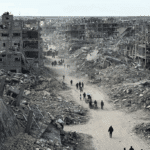Tunis, 16 June 2015 – Today, with the support of Avocats Sans Frontières, the Forum Tunisien pour les Droits Économiques et Sociaux (Tunisian Forum for Economic and Social Rights – FTDES) is filing a “region as a victim” submission to the Instance Vérité et Dignité (Truth and Dignity Commission – IVD). This file intends to establish “region as a victim” status for the Kasserine governorate. More generally, it aims to tackle the issue of regional inequality created before the 2011 revolution. This is the first such submission made during the transitional justice process in Tunisia.
Filing the “region as a victim” submission goes back to the roots of the Tunisian Revolution: the fight against inequality and realisation of economic and social rights. Marginalised and abandoned by an excessively centralised power structure, certain regions were excluded from development under the authoritarian regime that came to an end on 14 January 2011.
The Kasserine governorate is the most obvious example of this systematic marginalisation, which resulted in an excluded population, unable to realise or defend their most basic economic and social rights, such as education, health and work.
Situated in central-west Tunisia, the governorate has a population of approximately 430,000 and the lowest human development indicators in the country. “More than 25% of the workforce is unemployed, one in every three homes has no access to drinking water and the illiteracy rate is 32%, compared to 12% in Tunis”, notes Alaa Talbi, Executive Director of the FTDES. This situation means that people emigrate to more productive regions in the hope of finding employment, often in wretched living conditions.
Antonio Manganella, ASF’s Head of Mission in Tunisia, considers that “four years after the Revolution, expectations of the most marginalised populations have not been met by government institutions. Now in order to be effective, the transitional justice process must also tackle the issue of regional inequality caused by the regime’s action, or inaction.”
With this “region as a victim” submission, the FTDES, supported by ASF, is calling on the IVD to examine the situation in Kasserine and other regions that could be considered as having suffered systematic marginalisation or exclusion. It is also asking the IVD to recommend measures, especially for State authorities, to deal with the causes and consequences of the marginalisation suffered by Kasserine and other regions in Tunisia. Finally, the recommendations aim at ensuring these situations do not reoccur in the future.
Measures that the IVD recommends must be part of the process to implement certain constitutional gains such as decentralisation, positive discrimination and implementation of provisions for participative democracy and governance, enabling civil society to participate in regional planning for development projects.
“We hope that our initiative will lead to measures benefitting integrated development in different regions of the country. Because we are convinced that transitional justice in Tunisia can play a fundamental role in the emergence of a developmental model that observes human rights and effectively establishes a democratic State”, Alaa Talbi concludes.
ASF has been working in Tunisia since 2012, implementing projects supporting human rights NGOs and legal professionals in reforming the judicial system and establishing transitional justice mechanisms, as well as creating accessible, high-quality legal aid services. ASF works with these key stakeholders to ensure that they put the rights-holders at the centre of their actions, and are guided by the input of the final beneficiaries.
You can access the press file on the Kasserine “Region as a Victim” submission (in English), or access the file submitted to the IVD (in French and in Arabic)
Cover picture: © Thomas Cantaloube / Mediapart / 2011



